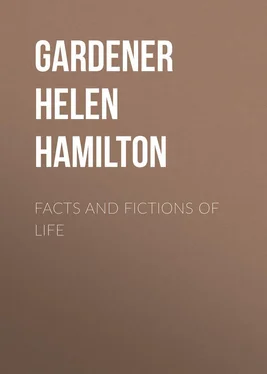Helen Gardener - Facts and Fictions of Life
Здесь есть возможность читать онлайн «Helen Gardener - Facts and Fictions of Life» — ознакомительный отрывок электронной книги совершенно бесплатно, а после прочтения отрывка купить полную версию. В некоторых случаях можно слушать аудио, скачать через торрент в формате fb2 и присутствует краткое содержание. Жанр: foreign_antique, foreign_prose, на английском языке. Описание произведения, (предисловие) а так же отзывы посетителей доступны на портале библиотеки ЛибКат.
- Название:Facts and Fictions of Life
- Автор:
- Жанр:
- Год:неизвестен
- ISBN:нет данных
- Рейтинг книги:4 / 5. Голосов: 1
-
Избранное:Добавить в избранное
- Отзывы:
-
Ваша оценка:
- 80
- 1
- 2
- 3
- 4
- 5
Facts and Fictions of Life: краткое содержание, описание и аннотация
Предлагаем к чтению аннотацию, описание, краткое содержание или предисловие (зависит от того, что написал сам автор книги «Facts and Fictions of Life»). Если вы не нашли необходимую информацию о книге — напишите в комментариях, мы постараемся отыскать её.
Facts and Fictions of Life — читать онлайн ознакомительный отрывок
Ниже представлен текст книги, разбитый по страницам. Система сохранения места последней прочитанной страницы, позволяет с удобством читать онлайн бесплатно книгу «Facts and Fictions of Life», без необходимости каждый раз заново искать на чём Вы остановились. Поставьте закладку, и сможете в любой момент перейти на страницу, на которой закончили чтение.
Интервал:
Закладка:
A short time ago I read a story of the late war. The burden of it was that, if a soldier had been brave and loyal, he could also be depended upon to be honest. I happened to read the story while under the same roof with an old soldier who was at that time a judge on the bench. He had served faithfully while in the army; he was brave and he, no doubt, deserved the honorable discharge he received, and yet while he sat on the bench, he applied for a pension on the ground of incurable disease "contracted in active service." While those papers were being investigated and one doctor was examining him for his pension, he also applied and was examined for life insurance as a perfectly sound man and healthy risk, and he got both .
The fact is, human nature is very much mixed. Good and bad is not divided by classes but is pretty well distributed in the same individual. Weakness and strength, wisdom and ignorance, impulse and reason, play their part in the same life with all the other attributes, passions, and conditions, and the literature which makes any individual the personification of good or of evil leads astray its confiding readers. Woman has been represented in literature as emotion culminating in self-sacrifice and matrimony. That was all. And even unto this day many persons can conceive of her in no other light. The idea has always been productive of infinite misery to woman whose whole book of life was read by these pages only, as well as to man who had carefully to spell out the other pages in the characters of wife or daughter when it was too late for him to learn new lessons, or to develop a taste for an unknown language.
Man has been known as pure reason touched with chivalry and devotion, or else as a dangerous animal who preys upon his kind. There may be – IN some other life or world – representatives of both of these classes, but they are not the men with whom we live, and, therefore, whose acquaintance it is desirable we should make as early as possible.
That a large family is a crown of glory to the parents and an inestimable boon to the state, is an idea running through literature. Is it a fact or is it one of the fictions of fiction which it were well to stimulate and galvanize into life less persistently? What is the answer from reform schools and penal institutions, filled by ignorance and passion held in bondage by poverty; from cemeteries where mothers and babies of the poor and ill-nurtured are strewn like leaves; from, the homes of the educated and well to do where small families are the rule – large ones the deplored exception? What is the logical reply in countries whose sociological students sigh over the struggle for existence and a scarcity of supplies; "over population" and desperate emigration? Misery and vice bearing strict proportion to density of population and poverty, surely offer a hint that at least one of the fictions of fiction has gone far to do a serious injury to man.
But the fiction of fictions which has done more real harm to the human race than any other, perhaps, is the one which dominates it – the idea that woman was created for the benefit and pleasure of man, while man exists for and because of himself.
Fiction has utilized even her hours of leisure and amusement to sap the self-respect of womanhood while it helped very greatly to brutalize and lower man by keeping – in this insidious form – the thought ever before him that woman is a function only and not a person, and that even in this limited sphere she is and should be proud to be man's subject. "He for God only, she for God in him."
It is true that since the advent of women writers fiction has shown a tendency to modify, to a limited extent, this previously universal dictum, but the thought still dominates literature greatly to the detriment of morals and of the dignity of both men and women.
"The woman who has no history is the woman to be envied," says literature – and yet people do not envy her any more than they do the man of like inconspicuous position. No one wishes that she might go down to history, if one may so express it, as history less. No one points with pride to Jane Smith as his illustrious ancestor any more than if Jane had chanced to be John. To have been a Mary Somerville, or an Elizabeth Barrett Browning, or a George Eliot, most historyless women would be willing to change places even now, and as for "those who come after," can there be a question as to which would give more pride or pleasure to man or woman, to say – "I am the son, or the brother, or the niece of Mrs. Browning," or to say, "Jane Smith, of Amityville, is my most famous relative?"
I have my suspicions that even 1 1 Fitzgerald "thanked God" when Mrs. Browning died. See reply by Robert Browning in Athenaeum.
Mr. Fitzgerald would waver in favor of Elizabeth in case both women were his cousins. In public, at least, he would mention Jane less frequently and with less of a touch of pride. Personally he might like her quite as well. That is aside from the question. I have no doubt that he might like John Smith as well as Shakespeare, personally, too, and John may have led a happier life than William, but is a man with no history to be envied for that reason? The application is obvious.
One of the most insidious fictions of fiction, which it seems to me is harmful, is the theory that the good are so because they resist temptation, while the bad are vicious because they yield easily – make a poor fight.
Leaving out heredity and its tremendous power, it is likely that you would have yielded under as strong pressure as it took to carry your neighbor down. I say as strong pressure – not the same pressure – for your tastes not being the same, your temptations will take different forms. 2 2 Our lives progress on the lines of least resistance." – Van Dbr Waukr, M. D.
If you had been born of similar parents and on Cherry Hill; if you had been one of a family of ten; if you had been stunted in mind and in body by want of nourishment; if you had been given little or no education; if you had helped to get bread for the family almost from the time you could remember; your record in the police court would not differ very greatly from that of those about you. In nine cases out of ten you would be where you sent that convict last year. Your pretty daughter would be the associate of toughs. She might be pure – in the sense in which the word is applied to women – but she would have a mind muddy and foul with the murk and odors of a life fit only for swine. She would marry a brute who honestly believes that so soon as the words of a priest or a magistrate are said over them, she belongs to him to abuse if he sees fit, to impose upon, lie to, or to let down into the valley of death for his pleasure whenever he sees fit, and quite without regard to her opinions or desires in the matter. She would be an old and broken woman at thirty, ugly, misshapen, and hopeless, with hungry-faced children about her, whose next meal would be a piece of bread, whose next word would be too foul to repeat, whose next act would disgrace a wolf.
In turn they would perpetuate their kind in much the same fashion, and some of your grandchildren would be in the poor-house, some in prison, some in houses of ill-repute, and perchance some doing honest work – sweeping the streets or making shirts for forty cents a dozen for the patrons of a literature that goes on promoting the theory that the chief duty of the poor is to irresponsibly bring more children into the world – to work for them as cheaply as possible. To the end that they may restrict their own families to smaller limits and – by means of cheaper labor caused largely by over population from below – clothe their loved ones in purple and build untaxed temples of worship, where poverty and crime is taught to believe in that other fiction of fictions – the "providence" that places us where we deserve to be and where a loving God wishes us to be content.
Читать дальшеИнтервал:
Закладка:
Похожие книги на «Facts and Fictions of Life»
Представляем Вашему вниманию похожие книги на «Facts and Fictions of Life» списком для выбора. Мы отобрали схожую по названию и смыслу литературу в надежде предоставить читателям больше вариантов отыскать новые, интересные, ещё непрочитанные произведения.
Обсуждение, отзывы о книге «Facts and Fictions of Life» и просто собственные мнения читателей. Оставьте ваши комментарии, напишите, что Вы думаете о произведении, его смысле или главных героях. Укажите что конкретно понравилось, а что нет, и почему Вы так считаете.












![John Bruce - The Lettsomian Lectures on Diseases and Disorders of the Heart and Arteries in Middle and Advanced Life [1900-1901]](/books/749387/john-bruce-the-lettsomian-lectures-on-diseases-and-disorders-of-the-heart-and-arteries-in-middle-and-advanced-life-1900-1901-thumb.webp)